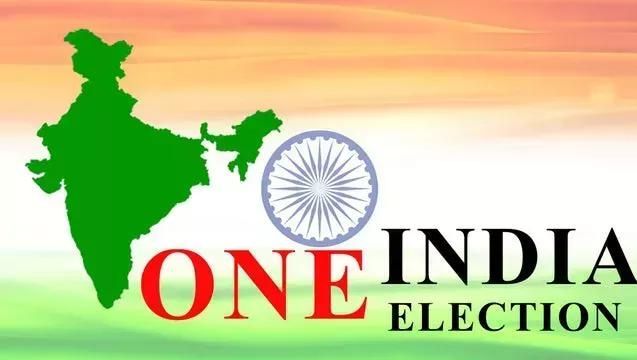NEW DELHI: Will political parties that are continuously complaining about the system during the elections, be ready to pass a unanimous proposal in Parliament for election reforms?
In the Lok Sabha elections this time, political parties have set new records on every front. The Election Commission has been flooded with complaints regarding the campaign, expenses, promises, and accusations. It is possible that once the election results are announced, there will be calls for reforms from the Supreme Court in the new Parliament.
Before the final vote on 1 June, the Prime Minister announced in an interview that he would intensify the campaign to build consensus for “one nation, one election.” He had mentioned this in June 2019, and subsequently, his government formed a high-level
It’s a fact that the general public is getting weary of the frequent elections for panchayats, municipalities, assemblies, and the Lok Sabha. However, many opposition parties, including the Congress, oppose this issue. Their biggest fear is that this system will make Prime Minister Narendra Modi and his Bharatiya Janata Party powerful in most states along with at the Centre.
The question is whether the political parties that are continuously making accusations and complaints about the system during the elections, will be ready to pass a unanimous proposal in Parliament for election reforms, new technology, social media, expenses in crores, not giving tickets to those charge-sheeted in serious crimes, improvements in the arrangements, from voter list creation in states to vote counting, etc. The issue of “one nation, one election” was not raised by Narendra Modi for his own dominance. I remember that in 2003, the then Vice President Bhairon Singh Shekhawat publicly suggested this, and at the time, I also wrote in support of it in my editorial column for the Hindi Outlook. Back then, Modi was the Chief Minister of Gujarat, far from Delhi, and there was no sign of him becoming Prime Minister. At the Centre, Atal Bihari Vajpayee was the Prime Minister of a coalition government. Shekhawat argued that holding elections simultaneously would reduce the heavy cost of elections and relieve the government from constant pressure. With legislative assembly elections in two or three states every year, the Central government cannot take tough decisions on issues related to the public.
Opposition to holding simultaneous elections in the country is baseless because, in 1952, 1957, 1962, and 1967, Lok Sabha and legislative assembly elections were held together. Constitution makers like Dr B.R. Ambedkar, J.B. Kripalani, Jawaharlal Nehru, Ram Manohar Lohia, Deendayal Upadhyaya, Chandra Shekhar, and Jyoti Basu either won or lost in these elections. Now, electronic voting machines and other digital facilities have made the process easier. Incidents of booth capturing and vote looting have become nearly impossible. However, election expenses have continued to rise.
There is no doubt that India’s elections are a model of democratic governance worldwide, and voters, from metropolitan areas to remote villages, have become more active and aware. They now evaluate parties and candidates based on development in elections. However, there is dissatisfaction over high expenses, false promises, and the lack of attention given to their constituencies by MPs or MLAs after the elections. Not only ruling leaders, but also former Chief Election Commissioners of the country have made several important recommendations for election reforms. Especially the new government, Parliament, Election Commission, and Supreme Court, which will be formed after June 4, will need to make decisions to curb the millions of expenses and other tactics used by parties, candidates, their supporters, organizations, companies, and indirect foreign elements who cleverly bypass all rules, laws, and codes of conduct.
This time, on the day of voting, opposition parties accused the Prime Minister and other leaders of violating election rules and the code of conduct, particularly targeting Narendra Modi’s silent meditation at the Vivekananda Memorial in Kanyakumari. However, objecting to photos and videos of silent meditation seems strange. It shows transparency, as the nation gets information about its leader and can even draw some inspiration. Similarly, there was controversy over former Prime Minister Manmohan Singh’s statements about providing benefits to Muslims in reservations and their first rights. Singh later offered some clarification. However, Rahul Gandhi and Mallikarjun Kharge face records of their senior colleague Salman Khurshid, publicly promising 9% reservation for Muslims in previous elections. Former Chief Election Commissioner S.Y. Quraishi detailed the complaint received by the Election Commission in his book. This means that the law minister in the Manmohan Singh government advanced this proposal, which is why the BJP strongly raised the issue. Reservation based on religion and caste was deemed inappropriate according to the code of conduct.
In this election, an extraordinary event occurred with the Supreme Court’s decision to grant interim bail to Chief Minister Arvind Kejriwal for election campaigning from jail. He was supposed to surrender and return to jail on June 2, immediately after the campaign ended. However, in the final stages of the campaign in Delhi, Punjab, and other states, Kejriwal began campaigning to extend his bail period, aiming for sympathy votes. He released videos and interviews, claiming inadequate medication and medical care in Tihar Jail under his Delhi government, and mentioned his elderly parents and his sacrifice for freedom like Bhagat Singh.
Can the Congress, opposing him in Punjab, lodge a complaint with the Election Commission about this last-minute campaign? Therefore, before the next elections, comprehensive consensus must be built for election reforms, implementing already passed decisions like 33% reservation for women in Parliament and legislative assemblies, and a uniform civil code.

